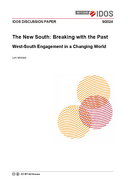
The New South: breaking with the past: West-South engagement in a changing world
Ishmael, Len (2024)
Discussion Paper 9/2024
As the world continues to fracture into different blocs, a new world order is in the making. Some even argue that a new Cold War has commenced. Countries of the South are adding more muscle to the G20, and an array of non-western groupings are gaining momentum, forging a new identity: The New South